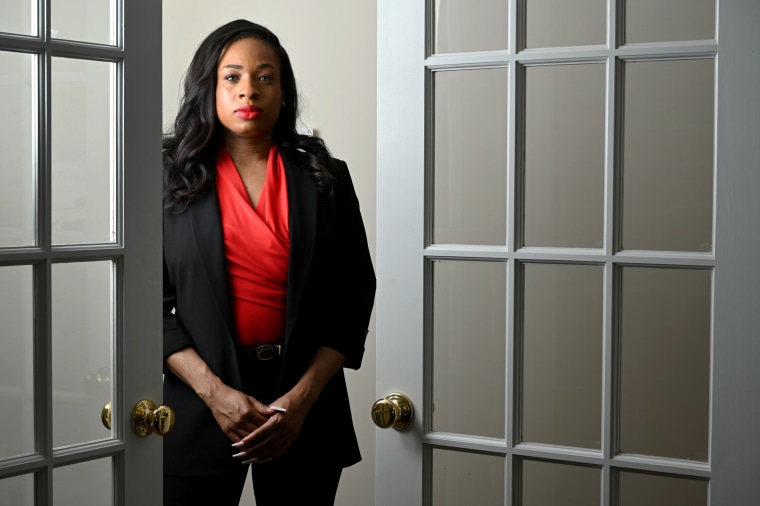Dinner couldn't have gone better for Juanisha Brooks who was out to celebrate her sister's 37th birthday.
They caught up on life over appetizers at a restaurant near the National Harbor in Maryland.
In the early morning of March 6, Brooks was headed home when she noticed emergency lights trailing her on I-495.
Believing it was an ambulance in distress, she pulled over on the shoulder of a highway exit ramp close to her home in Alexandria, Virginia, about 15 minutes from where she had eaten dinner, Brooks said in an interview Tuesday.
It was sometime past 2 a.m.
Virginia State Trooper Robert G. Hindenlang was instead pulling her over, only she said she wasn't sure why despite asking him.
A state prosecutor later concluded there was no basis for the traffic stop.
Yet, Brooks found herself being pulled over in the dark and cold.
"To my surprise, it immediately escalated," said Brooks, 34, a Black woman who works for the Defense Department.
Hindenlang asked her multiple times to exit her vehicle without initially providing an explanation, dashcam video shows.
"What made you pull me over?" Brooks asked.
"Can you step outside and I'll show you," Hindenlang responded, according to the dashcam video.
When she didn't get out of the car, Hindenlang, who has been a trooper for 24 years, unlocked Brooks' door and dragged her out of the car. He then forced her against the vehicle and handcuffed her.
Brooks tried reaching for her cellphone, but it fell out of her hands during the tussle.
"That was my lifeline to record what was happening. When that dropped, I really became fearful for my life and truly thought I was going to die," she said. "I felt so helpless. All I could think about was Sandra Bland and Philando Castile."
Bland, a Black woman, was found hanged in a Texas jail cell in July 2015 days after she was arrested during a traffic stop. Castile, a Black man, was fatally shot by a Minnesota police officer during a traffic stop in July 2016.
"I always thought police were there to serve and protect. But now, I don't believe that," Brooks said. "Every instance where I could have been protected, he chose to harm."
After she declined a breathalyzer test, Hindenlang said he was charging her with driving under the influence, according to the dashcam audio.
Brooks was taken to the Fairfax County Jail, where she took a breathalyzer test that showed a 0.0 blood alcohol level, according to a Virginia State Police investigative report.

She was charged with misdemeanor eluding, obstruction of justice, reckless driving and failing to have headlights on, a Virginia State Police spokesperson said.
Fairfax Commonwealth's Attorney Steve Descano dismissed all charges against Brooks on April 16 and requested the Virginia State Police open an internal affairs investigation.
"It's sickening and unacceptable that any member of our community fears for their safety during a routine traffic stop," he said in a statement.
In a letter addressed to the division commander of the state police's Office of Internal Affairs, Descano wrote that after reviewing the dashcam video, "it appears that the stop was without proper legal basis" given a recent change in the law that banned pulling people over for dark taillights and that the video "does not provide a factual basis to support the warrants or summons issued."
"There is much in the dashcam footage, the Troopers' written reports, and the charging decisions that give me pause," Descano wrote, according to a copy of the letter provided to NBC News by Descano's office.
Hindenlang, 49, could not immediately be reached at numbers listed for him.
Virginia State Police spokeswoman Corinne Geller said Hindenlang and a trainee saw Brooks driving without headlights and taillights, tailgating and making unsafe lane changes, "which is often consistent with driving under the influence."
"Brooks was taken into custody due to her persistent refusal to comply with the trooper's requests," Geller said in a statement.
Descano found that neither the headlight nor taillight statutes were violated, his spokesman, Benjamin Shnider, said.
Brooks said she has filed a formal complaint against the Virginia State Police, but there is no record of it. Geller refuted the claim.
"State police learned about her concerns through a third party and took it upon ourselves to contact her and follow up on her concerns," she said. "It was after that conversation took place that state police self-initiated an internal administrative review and investigation of the traffic stop."
Geller said the administrative investigation is ongoing.
Dennis Kenney, a professor at the John Jay College of Criminal Justice in New York and a former police officer, said pretextual traffic stops are problematic for a number of reasons.
"The whole idea of the pretext stop: That I'm stopping you on a flimsy traffic requirement so that I can actually explore other things," he said. Police often use such stops as a justification to search cars, he said.
The pretext is subject to so much discretion, Kenney said, that a great deal of bias can work its way in. Pretextual traffic stops are often disproportionately applied to people who are Black and Latino and in poorer neighborhoods, he said.
This is why some advocates are calling for police not to work traffic violations at all, Kenney said.
"There's a movement to restrain traffic enforcement," he said, much like the issue of whether police should respond to people believed to be in mental crisis.
Brooks said she sustained bruises to her hand and arm and that the traffic stop could have affected her career and top-secret security clearance. She said she has paid a lawyer thousands of dollars to represent her.
"I haven't slept a full night since March. Even last night, I had nightmares about the police," she said. "All I can replay is the incident re-happening."
